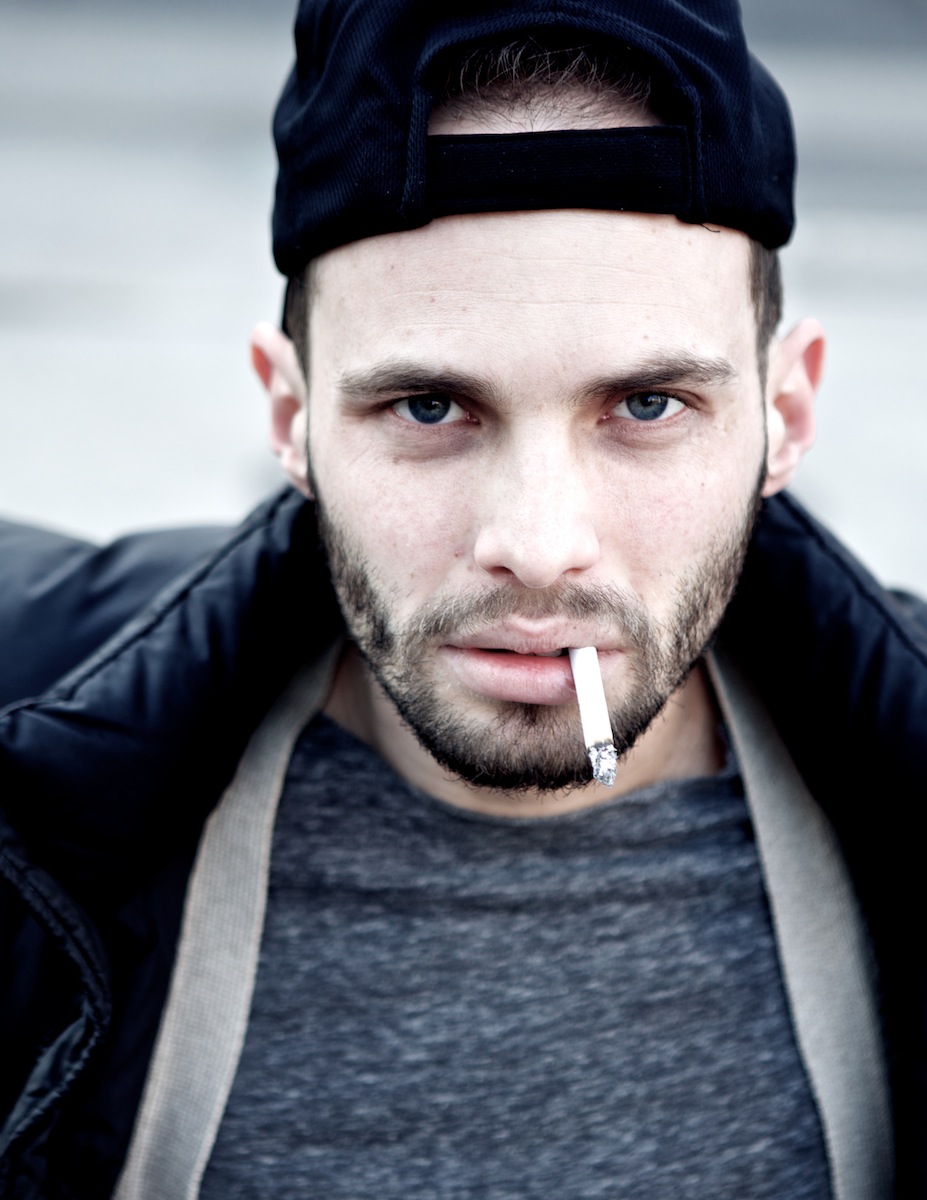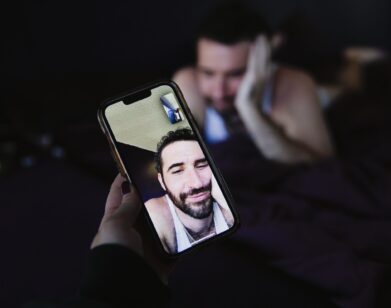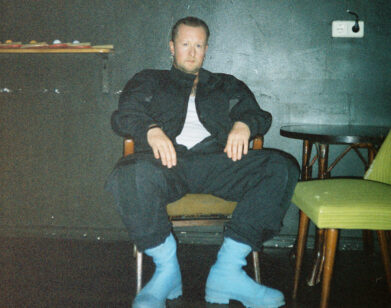The Veut in Autre Ne Veut

ABOVE: ARTHUR ASHIN, AKA AUTRE NE VEUT. PHOTO BY FRANK SUN
“I have these cool cousins in their early 20s, and I feel like a dad,” Arthur Ashin laughed when we spoke to him on the phone a few weeks ago. “I’m like, ‘YOLO.’ And they’re like, ‘Dude, YOLO is done.'”
With all due respect to Ashin’s cousins, chances are good he’s still the coolest one in the family. Anxiety, his second LP as Autre Ne Veut, and the first for which he’s figuratively the face (his self-titled debut was released anonymously) is one of the freshest, most dynamic albums we’ve heard in years.
Anxiety is both of a piece with the current trend in independent music toward R&B influences—music for a sax and a synthesizer to hook up to—and something that resides wholly in its own creative space. Take a song like “Ego Free Sex Free,” which opens with little more than some electronic handclaps, a slow drumbeat, moaning backup vocals, and Ashin’s robust falsetto broaching the topic of “your sexy body.” By the end of the song, you might wonder when the layers of frenetic synths and mewling hard-rock guitar riff snuck in—unless you’re enjoying it too much to care.
ALEXANDRIA SYMONDS: Anxiety‘s not a concept album, but did you have a sense of narrative going into putting these songs together?
ARTHUR ASHIN: It’s a concept album in the sense that the title ties in together all the themes of the record. It’s basically about the last three or so years of my life, the little tensions and moments throughout it.
SYMONDS: I’m surprised a little bit by the timbre of your speaking voice. With someone like Prince, maybe, who sings a lot in falsetto, you often get that higher tone. But yours isn’t, really.
ASHIN: It’s also early morning for me. [laughs]
SYMONDS: [laughs] Were you classically trained?
ASHIN: I’ve done some classical voice training, and I did a good deal of choral music when I was younger. I did some classical training, but I wasn’t fully classically trained. I was never a prodigy.
SYMONDS: You have a very strong sense of your voice as an instrument, and of when to let it go raw versus when to play around with it and manipulate it. When you construct a song, is it a pretty intuitive thing to know which of those things to do?
ASHIN: Yeah, a lot of them are multiple takes, and it’s about what feels best at any given moment. This record was designed very much to be a studio record, not a performance showcase record. There was a curatorial process that went into playing with the voice after the fact. But that was not necessarily intentional, or in my mind exactly where that would happen, until after I had already done the performances.
SYMONDS: Did you work with anyone? I know there are some performance collaborations, but you produced it yourself, right?
ASHIN: Yeah, I was the primary producer. Studio records require a lot more people involved, and there was some definite collaborative energy. Dan Lopatin, from Oneohtrix Point Never, was in the studio with me and was functioning as a primary sounding board for the last stretch of the pre-mix. And Joel Ford was there—Dan and Joel run Software, which is the label that I’m on. And we all kind of worked together in the very early recording stages, after I had written the songs. Joel did the initial drum programming stuff. Dan did some keyboard arrangement things. And I brought in my friend Andrew, who did play the electric guitar. There’s defintely collaborators along the way. I was kind of the executive decision maker.
SYMONDS: You’ve known Dan Lopatin a long time, right, you went to school together?
ASHIN: Yeah.
SYMONDS: What’s it been like to come up together, but making very different kinds of music? Do you think it’s easier to be friends because you’re not trying to get at the same thing?
ASHIN: That’s possible. I’m really happy for Dan. [laughs] The best part is to have someone a few years ahead in this process from me and know so much and is really willing to be generous with his time and sympathy. Stupid shit, like, you don’t really realize it’s going to be stressful or upsetting until you’re in a position where someone is saying weird things about your teeth on a message board. And you’re like, “Why am I upset because of somebody making fun of my teeth on a message board?” And it’s like, “Yeah, you can’t complain about that to somebody who doesn’t have people complaining about them on a message board.” It’s cool to have a friend that has been through some of the same stupid shit and is supportive and doesn’t make fun of you. [laughs]
SYMONDS: [laughs] How much do you let yourself read message boards? That’s a question people ask musicians a lot—”Do you read your reviews?” But I think message boards specifically are a totally different, wild frontier.
ASHIN: Exactly. I don’t think I’m allowed to read message boards. [laughs] I think I’m staying off. I stumbled onto one by accident, cause they show up on Google searches or on your Google feed, which is something that I set up at some point because when there’s press, I have some place for it to go. I was my own manager for a long time and you need that if you’re ever talking to people.
SYMONDS: Everybody has a Google alert set up! You don’t have to justify it.
ASHIN: Oh, yeah, yeah. So it shows up and then it’s there and you’re like, “All right, I’m going to look at this message board.” And, it’s awful. [laughs] It’s not even all awful, it’s just that there’s somebody that’s inevitably awful. So I think I’m going to ban myself from message boards.
SYMONDS: Has there been anything that you’ve read that’s been published somewhere maybe more legitimate than a message board that you thought was completely wrong?
ASHIN: Yeah, it happens all the time. But I can’t tell if it’s because I’m lying… I don’t think I’m an intentional liar, but I’m a little bit of an exaggerator sometimes. If I’m exaggerating and the journalist exaggerates on top of that, then we end up in funny territory. It’s not really anyone’s fault; everyone’s job is to make things sound more interesting than they probably actually are. But that stuff doesn’t bother me at all. I’d rather proliferate funny little rumors than not. Like, “Oh, that’s out there. People will think that about me. Cool.”
SYMONDS: Now I’m dying to know what, in the standard Autre Ne Veut narrative, isn’t true. But you probably can’t tell me, can you?
ASHIN: [laughs] Off the record, later.
SYMONDS: You turned 30 last year—is that something you had to contend with?
ASHIN: No, I love it. I feel like since I was 27, I was calling myself 30. And then, when it happened, it was like, “I’m finally here now. This is it.” [laughs]
SYMONDS: I think a lot of people do that. You feel like you’re 16 for about five years, then you feel like you’re 21 for about five years, then you immediately start to feel 30.
ASHIN: Yeah. Although, after I turned 30 I started to feel 21 again, which is kind of a bad look. [laughs]
SYMONDS: Oh no, you’ve got to be careful with that.
ASHIN: I know, I really do.
SYMONDS: Like, playing 285 Kent and everything.
ASHIN: [laughs] Exactly!
SYMONDS: One of the things that I really love about this album, and the R&B renaissance in general, is that a lot of these songs remind me of the first songs I can ever remember hearing. Like, my mom was super into Lisa Stansfield.
ASHIN: Yeah.
SYMONDS: Do you remember the first song that you loved?
ASHIN: Not exactly. My first super-worn-out tapes were Michael Jackson’s Bad and the soundtrack to Dirty Dancing. The soundtrack to Dirty Dancing is actually really phenomenal. I hadn’t listened to it for years, but really, front-to-back insane soul classics. It’s definitely in that vein of soulful music in pop form. That was the music I loved, loved, loved as a kid. That’s why it freaked me out so much when The Weeknd covered “Dirty Diana,” because that was the thing that I wanted to do for years. And I was waiting until my voice gets good enough, and then he just kills it.
SYMONDS: I don’t know that you can step on that one. [laughs]
ASHIN: No, no, you can’t fuck with that. So that’s done. That’s one cover I’ll never be able to do. Bad front to back, and Dirty Dancing. I probably literally destroyed the tape, just by playing it over and over and over on my boombox.
SYMONDS: How old would you have been then?
ASHIN: What year did Bad come out? What year did Dirty Dancing come out? I don’t know, like four or five?
SYMONDS: So you were really a little kid.
ASHIN: Yeah, I think so. I’m imagining it’s ’87, and I was born in ’82, so I was five then. Yeah, a little kid.
SYMONDS: Were your parents into music? Was there a lot of music in your house, generally?
ASHIN: I was the generator of music. I don’t think my parents really are that into music. They had both been living out of the country, in Kenya, for a really long time. In Kenya, what they listen to, strangely enough, is South African music, West African music, not really very much East African music. Reggae and American R&B. That was the stuff, like King Sunny Ade and Bob Marley were what played in my house a little bit when I was a kid. My mom was into Enigma, Phil Collins, and Enya and shit like that. So that was weirdly informative, also, for me, all that stuff.
SYMONDS: I wouldn’t have guessed Enigma, but it makes sense.
ASHIN: Exactly. I think, in a weird way, that was pre-choice for me, all that music. Although I’ve definitely spent a lot of time with reggae subsequently, I think a lot of the pre-choice music strangely informs what I do probably more than anything else. Pre-cognition, pre-choice—this is what the basis of music is for me.
SYMONDS: That makes a lot of sense, since it seems like you’re trying to make music that taps into memory, or is interested in that subconscious level.
ASHIN: Definitely. This is close to being a catharsis project for me, so whenever you stop spending time intellectualizing what you’re doing, you end up in that zone.
AUTRE NE VEUT’S ANXIETY IS OUT NOW. FOR MORE ON THE ARTIST, VISIT HIS WEBSITE.






